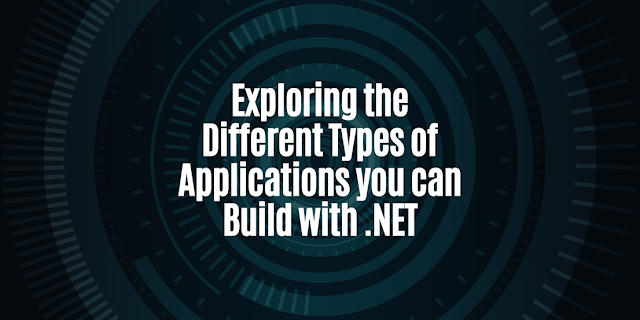.NET is a powerful, versatile platform that allows developers to build a wide range of applications. From simple desktop apps to complex web applications, .NET provides a robust set of tools and frameworks that enable developers to create high-performing, scalable, and secure applications. In this article, we will explore the different types of applications that can be built with .NET.
- Windows Forms Applications: Windows Forms is a user interface (UI) framework that allows developers to create desktop applications for Windows. With Windows Forms, developers can create traditional-looking desktop applications with a range of controls, such as buttons, text boxes, and labels.
- WPF Applications: Windows Presentation Foundation (WPF) is a UI framework that allows developers to create modern, visually stunning desktop applications for Windows. WPF applications use XAML, a markup language for defining the layout and appearance of UI elements, to create rich, interactive user interfaces.
- ASP.NET Web Forms Applications: ASP.NET Web Forms is a web application framework that allows developers to create web applications using a page-based model. With Web Forms, developers can create traditional-looking web applications with a range of server controls, such as buttons, text boxes, and labels.
- ASP.NET MVC Applications: ASP.NET MVC is a web application framework that allows developers to create web applications using the Model-View-Controller (MVC) pattern. With MVC, developers can create modern, visually stunning web applications with a clear separation of concerns.
- ASP.NET Core Applications: ASP.NET Core is a cross-platform, open-source web application framework that allows developers to create web applications that can run on Windows, Linux, and macOS. With ASP.NET Core, developers can create modern, high-performing, and scalable web applications.
- Xamarin Applications: Xamarin is a cross-platform mobile application development framework that allows developers to create mobile apps for iOS, Android, and Windows using C# and the .NET Framework. With With Xamarin, developers can create native mobile apps for multiple platforms using a single codebase. This allows developers to share code and logic across different platforms, saving time and effort. Xamarin also provides access to the underlying platform APIs, allowing developers to create truly native apps that take full advantage of the platform's capabilities.
- UWP Applications: Universal Windows Platform (UWP) is a platform for creating apps that can run on multiple Windows 10 devices, including PC, Xbox, HoloLens, and IoT devices. UWP provides a single codebase that can target multiple form factors and devices, making it easy to create apps that can run on a wide range of devices.
- Azure Cloud Applications: Azure is a cloud computing platform that provides a wide range of services for building, deploying, and scaling applications. With Azure, developers can easily create, deploy, and scale web applications, mobile apps, and other types of applications.
- IoT Applications: IoT stands for Internet of Things, which refers to the growing network of physical devices, vehicles, buildings, and other objects that are embedded with sensors, software, and network connectivity. .NET provides tools and frameworks for creating IoT applications that can collect, analyze, and act on data from IoT devices.
- AI and Machine Learning Applications: .NET provides libraries for creating AI and Machine Learning applications, such as TensorFlow.NET and ML.NET. These libraries allow developers to use the power of AI and Machine Learning to create intelligent applications that can learn from data, make predictions, and automate tasks.
In conclusion, .NET is a powerful, versatile platform that provides developers with a wide range of tools and frameworks for creating a wide range of applications. Whether you're building a desktop application, a web application, a mobile app, or an IoT application, .NET has the tools and frameworks you need to create high-performing, scalable, and secure applications that meet your business needs.

